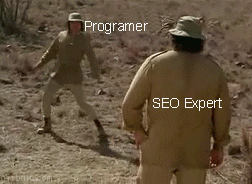Fabric Digital are an Auckland website design and Auckland digital marketing agency.

Search engine optimisation is a complicated process, it’s getting harder than ever to show on the first page on search engines than ever before. Which is why more and more businesses are employing a team of SEO professionals to help them develop a SEO strategy like Fabric who offer SEO services in Auckland, New Zealand.

As search engines are getting smarter every day, so it is getting harder to make your website outrank your competitors. Luckily there are a few easy on page tips that you can take on board to set your business up for SEO success. On page optimisation refers to all measures that can be taken directly within the website in order to improve its position in the search rankings. They’re often small changes that make it easier for search engines to crawl your website and understand what you do.
1. Page Titles
Page titles play an important role in SEO, a page title describes what each page in your website is about. Each page in your website needs to have a unique title that is around 50-60 characters long. It is also good practice to have the keyword in the start of the title as the closer to the start the more weight the words have. Although your page title should also sound natural, as it is not only there for SEO purposes it is also there to show the relevance of your site to users online.
2. Meta Descriptions
Meta descriptions play an important role in on page SEO optimisation. The meta description is what search engines use to see what topic you page is about so they know what audience to match it to. Each page in your website should contain a unique meta description that is around 150 characters long. This acts as a sales pitch about what each page is about.
3. Sitemap
A sitemap is a list of the pages within your website, having a clear sitemap makes it easier for search engines to index your website. It is good practice to create both XML and HTML versions. An HTML version is the first step. XML sitemaps can easily be submitted via Google webmaster tools. This file should be easily to find in your website so it can be used by search engine crawlers to follow the links to all your individual pages on your website.
4. Site Speed
If you website takes a long time to load it can negatively affect your position on search engines. It is good practice to use the page speed insights tool made by Google to check and optimise the speed of your website. As if your website takes more than 2 seconds to load chances are users won’t wait and will abandon the site. Google values its users experience highly so it will penalise you SEO wise if your website takes too long to load.
5. Responsive Design
It is more important than ever that your site is able to be viewed on all devices, as more and more users are on mobile devices. But it is also important for SEO as in 2015 Google started penalising websites that are not mobile-friendly.
6. Image Optimisation
It is important to use an alt attribute when you include images on your website. As search engines cannot ‘see’ your images, they can only ‘read’ the alt text. So through creating alt text relevant to both the image and the keywords you are targeting you can easily let search engines know what each image is and how it relates to your page.
7. URL Structure
It is important that your page URLs represent what each page is about. Including search engine friendly URLs for each of your pages is highly recommended, make it a lot easier for google to crawl your website. Generally shorter URLs perform better, but it is also important that URLs match the keywords you are trying to target.
8. Robots.txt File
A robots txt. File is a file that tells search engines how they should crawl the pages on their website, it also tells them which pages not to crawl. They are important for SEO as they can tell search engines to ignore duplicate pages on the website. You need to have a properly set up robots.txt file to ensure robots can crawl your website, while ignoring duplicate pages.